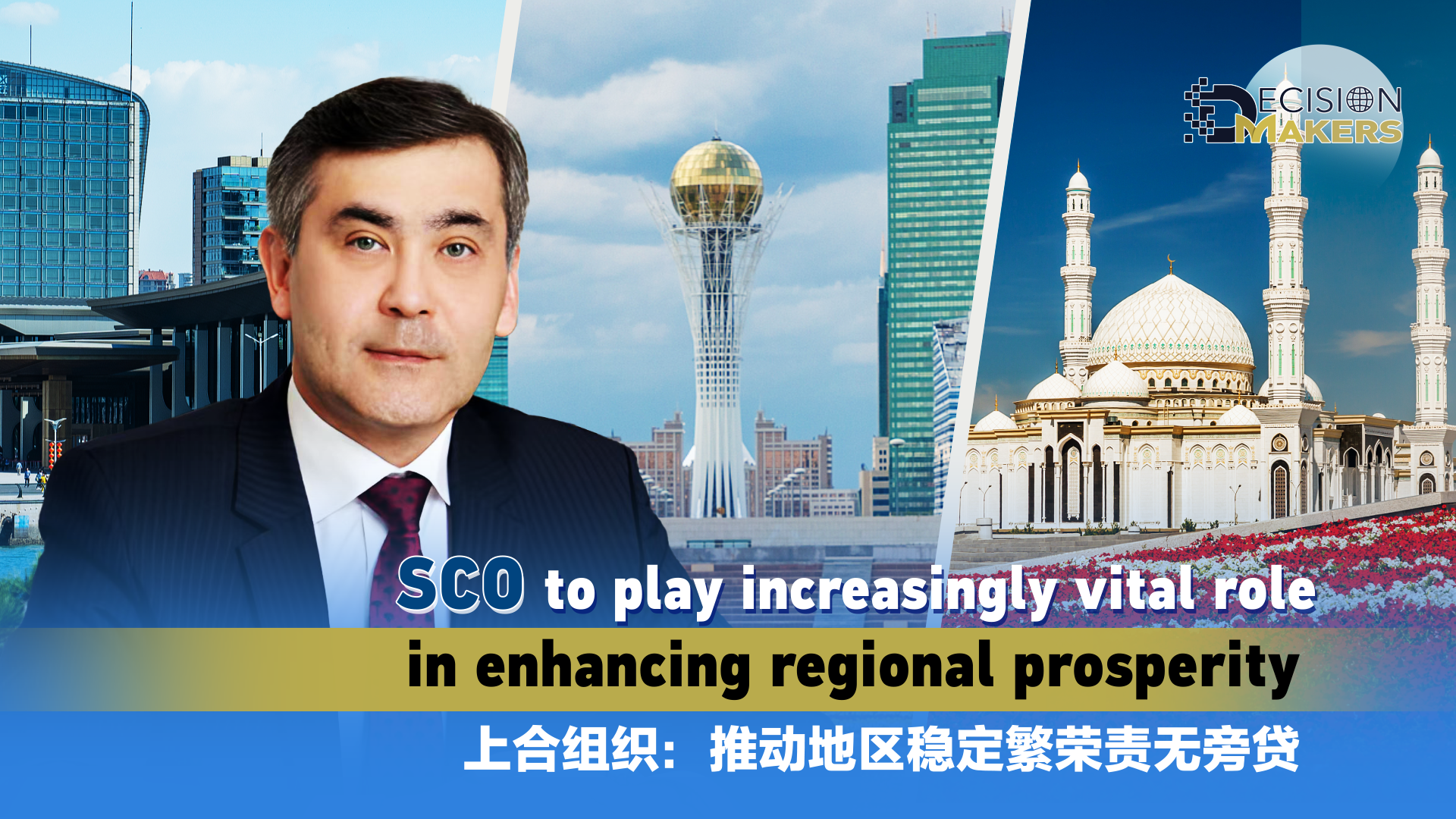
Editor's note: The world is entering a new period of turbulence and change, with issues of concern emerging one after another worldwide. Against this backdrop, the Shanghai Cooperation Organization maintains its position as a comprehensive cooperation grouping which contributes to regional development, peace and stability. With this year's SCO summit being held in Astana, Kazakhstan, on July 3-4, our special series of articles, "Shanghai Spirit in a Chaotic World," looks at the SCO from different perspectives. Decision Makers is a global platform for decision makers to share their insights on events shaping today's world.
By Nurlan Yermekbayev
The Shanghai Cooperation Organization (SCO) is a unique international entity that traces its roots back to the Shanghai Five, which was founded by five countries: the People's Republic of China, Kazakhstan, Kyrgyzstan, Russia, and Tajikistan. These nations initially collaborated to foster an atmosphere of trust and stability along their national borders. By the end of the 20th century, having achieved these goals, the leaders of the Shanghai Five decided to extend their cooperation into a fully-fledged international organization.
Thus, in 2001, in Shanghai, the leaders of six countries signed documents formalizing the creation of the SCO. China's role within the SCO is particularly prominent and crucial. The organization's name itself includes "Shanghai," a major metropolis in China, and its headquarters are located in Beijing.
In the SCO, there are no big or small states. Today, the SCO family comprises 26 countries: 10 member states, two observer states, and 14 dialogue partners. All these nations adhere to principles of equality, consultation, and constructive problem-solving. This commitment to mutual respect and cooperative development embodies the "Shanghai Spirit," a unique hallmark of the SCO.
The "Shanghai Spirit" is built on six core principles defined by the member states: equality, mutual trust, mutual benefit, consultation, respect for diverse civilizations, and pursuit of common development. These principles resonate with the vision of Chinese President Xi Jinping, particularly his initiative to build a community with a shared future for mankind.
This vision promotes mutual benefit, peace, and progress, focusing on uniting efforts for joint development and shared prosperity, rather than dividing nations based on different interests.
All member states have contributed significantly to the development of the SCO. It is essential to highlight the substantial contributions of the current chair, the Republic of Kazakhstan.
It's worth noting that Kassym-Jomart Tokayev, the current president of Kazakhstan, even during his tenure as foreign minister in the late 1990s, advocated for the establishment of a full-fledged international organization in a Foreign Minister Council Meeting, which eventually became the SCO. Both the first and current presidents of Kazakhstan have consistently participated in all meetings of heads of state.
Since assuming the chairmanship of the SCO in July last year, Kazakhstan has consistently carried out its duties as chairman and proposed a number of important initiatives. During the summit in India last year, Kazakhstan's president clearly outlined the priorities his country would have during Kazakhstan's chairmanship, which include numerous initiatives in security, cultural and humanitarian cooperation, and trade and economic collaboration.
At this year's SCO summit, key documents such as the Energy Strategy and the Regulations of the SCO Investors Association are presented for approval by the heads of state. The second document, namely, the Regulations of the SCO Investors Association, will establish the operational framework for the association aimed at uniting investors from various countries to promote common development.
This year, at Kazakhstan's initiative, has been declared the Year of Ecology within the SCO, leading to numerous environmental activities and initiatives.
A range of documents are signed, focusing on environmental protection, seed production, and agricultural development. An Ecology Forum will be held in July, drawing attention to, and addressing, ecological topics such as water resource management and waste reduction. Kazakhstan has also proposed the creation of an SCO Association of Ports and Logistics Centers.
Of course, speaking about Kazakhstan's chairmanship, it is essential to note that it turned out to be very important and, perhaps, somewhat innovative, considering the current highly volatile global situation, with numerous challenges, various threats, armed conflicts and large risk zones.
In his address to the New Delhi summit last year, the President of Kazakhstan proposed a global initiative to promote world unity.
Considerable progress has been made to date. This initiative encapsulates the primary views and assessments of member states regarding the current global situation and the principles for establishing a new type of international relations based on justice, equality, and mutual respect.
The SCO is not a military-political bloc; it is not a bloc organization at all. Instead, it is an open entity focused on cooperation and the attainment of shared objectives. It is open to dialogue with all and is not directed against anyone. It bases all its work on finding common interests and reaching consensus on any issues.
Currently, we observe the growing demand and the increasing contribution of the SCO to regional development evidenced by the rising interest from other countries and international organizations. For instance, in the eight years since 2017, the number of member states has almost doubled. This surge in membership underscores the SCO's enhanced relevance and influence on the global stage.
With Belarus's accession to the SCO, it will truly become a Euro-Asian organization. Under these conditions, member states see the SCO's role as increasingly vital in strengthening international stability and finding peaceful solutions to any issues. Additionally, the SCO aims to enhance overall prosperity within its region through active development of trade and economic cooperation. Furthermore, all SCO member states desire the organization to deliver more practical benefits, providing greater tangible value to the peoples of our countries.
Nurlan Yermekbayev is the SCO's deputy secretary-general.

 中文
中文



